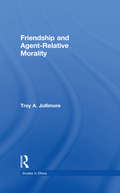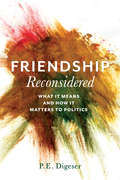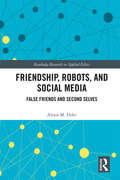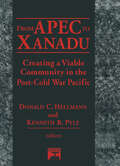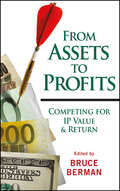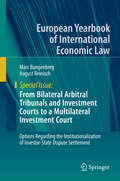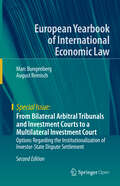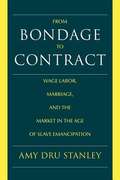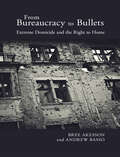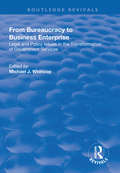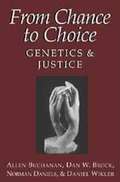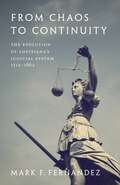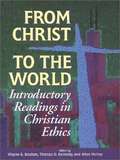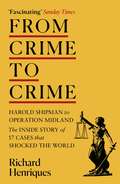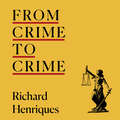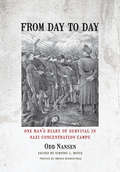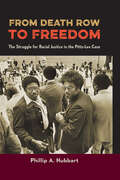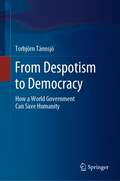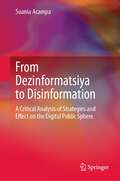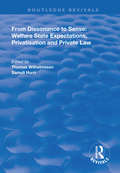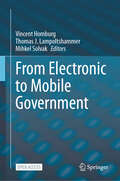- Table View
- List View
Friendship and Agent-Relative Morality (Studies in Ethics)
by Troy A. JollimoreFirst Published in 2001. Routledge is an imprint of Taylor & Francis, an informa company.
Friendship Reconsidered: What It Means and How It Matters to Politics
by P. DigeserIn the history of Western thought, friendship's relationship to politics is checkered. Friendship was seen as key to understanding political life in the ancient world, but it was then ignored for centuries. Today, friendship has again become a desirable framework for political interaction. In Friendship Reconsidered, P. E. Digeser contends that our rich and varied practices of friendship multiply and moderate connections to politics. Along the way, she sets forth a series of ideals that appreciates friendship's many forms and its dynamic relationship to individuality, citizenship, political and legal institutions, and international relations. Digeser argues that, as a set of practices bearing a family resemblance to one another, friendship calls our attention to the importance of norms of friendly action and the mutual recognition of motive. Focusing on these attributes clarifies the place of self-interest and duty in friendship and points to its compatibility with the pursuit of individuality. She shows how friendship can provide islands of stability in a sea of citizen-strangers and, in a delegitimized political environment, a bridge between differences. She also explores how political and legal institutions can both undermine and promote friendship. Digeser then looks to the positive potential of international friendships, in which states mutually strive to protect the just character of one another's institutions and policies. Friendship's repertoire of motives and manifestations complicates its relationship to politics, Digeser concludes, but it can help us realize the limits and possibilities for generating new opportunities for cooperation.
Friendship, Robots, and Social Media: False Friends and Second Selves (Routledge Research in Applied Ethics)
by Alexis M. ElderVarious emerging technologies, from social robotics to social media, appeal to our desire for social interactions, while avoiding some of the risks and costs of face-to-face human interaction. But can they offer us real friendship? In this book, Alexis Elder outlines a theory of friendship drawing on Aristotle and contemporary work on social ontology, and then uses it to evaluate the real value of social robotics and emerging social technologies. In the first part of the book Elder develops a robust and rigorous ontology of friendship: what it is, how it functions, what harms it, and how it relates to familiar ethical and philosophical questions about character, value, and well-being. In Part II she applies this ontology to emerging trends in social robotics and human-robot interaction, including robotic companions for lonely seniors, therapeutic robots used to teach social skills to children on the autism spectrum, and companionate robots currently being developed for consumer markets. Elder articulates the moral hazards presented by these robots, while at the same time acknowledging their real and measurable benefits. In the final section she shifts her focus to connections between real people, especially those enabled by social media. Arguing against critics who have charged that these new communication technologies are weakening our social connections, Elder explores ways in which text messaging, video chats, Facebook, and Snapchat are enabling us to develop, sustain, and enrich our friendship in new and meaningful ways.
The Frightful Stage
by Robert Justin GoldsteinIn nineteenth-century Europe the ruling elites viewed the theater as a form of communication which had enormous importance. The theater provided the most significant form of mass entertainment and was the only arena aside from the church in which regular mass gatherings were possible. Therefore, drama censorship occupied a great deal of the ruling class's time and energy, with a particularly focus on proposed scripts that potentially threatened the existing political, legal, and social order. This volume provides the first comprehensive examination of nineteenth-century political theater censorship at a time, in the aftermath of the French Revolution, when the European population was becoming increasingly politically active.
Fritz Bauer: The Jewish Prosecutor Who Brought Eichmann and Auschwitz to Trial (German Jewish Cultures Ser.)
by Ronen SteinkeA biography of the German Jewish judge and lawyer who survived the Holocaust, brought the Nazis to justice, and fought for the rights of homosexuals. German Jewish judge and prosecutor Fritz Bauer (1903–1968) played a key role in the arrest of Adolf Eichmann and the initiation of the Frankfurt Auschwitz trials. Author Ronen Steinke tells this remarkable story while sensitively exploring the many contributions Bauer made to the postwar German justice system. As it sheds light on Bauer&’s Jewish identity and the role it played in these trials and his later career, Steinke&’s deft narrative contributes to the larger story of Jewishness in postwar Germany. Examining latent antisemitism during this period as well as Jewish responses to renewed German cultural identity and politics, Steinke also explores Bauer&’s personal and family life and private struggles, including his participation in debates against the criminalization of homosexuality—a fact that only came to light after his death in 1968. This new biography reveals how one individual&’s determination, religion, and dedication to the rule of law formed an important foundation for German post war society.&“What is clear—and what this book makes clear—is that without people like Fritz Bauer there would have been none of this prosecution of Nazi atrocities, no trials for Auschwitz camp guards or Adolf Eichmann, no rehabilitation of the German resistance against Hitler. Ronen Steinke deserves thanks for bringing this message of Fritz Bauer back to light in such an accessible form, balancing professional distance and sympathy.&” —Kai Ambos, Criminal Law Forum&“Illuminates the biography of a central actor in Germany&’s coming to terms with its Nazi past.&” —Jacob S. Eder, author of Holocaust Angst
From Apec to Xanadu: Creating a Viable Community in the Post-cold War Pacific
by Kenneth B. Pyle Donald C. Helleman Donald C. HellmanThis volume analyzes the concerns that must be addressed if Asia-Pacific Economic Cooperation (APEC) is to be a viable component of the post-Cold War international order, such as what the future role of the USA who made Asia's transformation possible since 1945, is as a leader in that region.
From Assets to Profits
by Bruce BermanEdited by IP communications expert Bruce Berman, and with contributions from the top names in IP management, investment and consulting, From Assets to Profits: Competing for IP Value and Return provides a real-world look at patents, copyrights, and trademarks, how intellectual property assets work and the subtle and not-so-subtle ways in which they are used for competitive advantage. Authoritative and insightful, From Assets to Profits reveals the most relevant ways to generate return on innovation, with advice and essential guidance from battle tested IP pros.
From Bilateral Arbitral Tribunals and Investment Courts to a Multilateral Investment Court: Options Regarding The Institutionalization Of Investor-state Dispute Settlement (European Yearbook of International Economic Law)
by Marc Bungenberg August ReinischThis book considers the potential setup for a future Multilateral Investment Court (MIC). The option of an MIC was first discussed by the EU Commission in 2016 and has since been made an official element of the EU Common Commercial Policy. In 2017, UNCITRAL also decided to discuss the possibility of an MIC, and on 20 March 2018, the Council of the EU gave the EU Commission the mandate to negotiate the creation of an MIC. The “feasibility study” presented here is intended to contribute to a broader discussion on the options for a new international court specialized in investment protection. The cornerstones of such a new permanent court are a strict orientation on the rule of law, reduced costs of investment protection, transparency considerations, aspects of consistency in case law, and the effective enforceability of MIC decisions.
From Bilateral Arbitral Tribunals and Investment Courts to a Multilateral Investment Court: Options Regarding the Institutionalization of Investor-State Dispute Settlement (European Yearbook of International Economic Law)
by Marc Bungenberg August ReinischThis open access book considers the potential setup for a future Multilateral Investment Court (MIC). The option of an MIC was first discussed by the EU Commission in 2016 and has since been made an official element of the EU Common Commercial Policy. In 2017, UNCITRAL also decided to discuss the possibility of an MIC, and on 20 March 2018, the Council of the EU gave the EU Commission the mandate to negotiate the creation of an MIC. The “feasibility study” presented here is intended to contribute to a broader discussion on the options for a new international court specialized in investment protection. The cornerstones of such a new permanent court are a strict orientation on the rule of law, reduced costs of investment protection, transparency considerations, aspects of consistency in case law, and the effective enforceability of MIC decisions.
From Bondage To Contract: Wage Labor, Marriage, And The Market In The Age Of Slave Emancipation
by Amy Dru StanleyThis book explores how a generation of American thinkers and reformers - abolitionists, former slaves, feminists, labor advocates, jurists, moralists, and social scientists - drew on contract to condemn the evils of chattel slavery as well as to measure the virtues of free society. Their arguments over the meaning of slavery and freedom were grounded in changing circumstances of labor and home life on both sides of the Mason-Dixon line. At the heart of these arguments lay the problem of defining which realms of self and social existence could be rendered market commodities and which could not. From Bondage to Contract reveals how the problem of distinguishing between what was saleable and what was not reflected the ideological and social changes wrought by the concurrence of abolition in the South and burgeoning industrial capitalism in the North.
From Bureaucracy to Bullets: Extreme Domicide and the Right to Home (Genocide, Political Violence, Human Rights)
by Bree Akesson Andrew R. BassoThere are currently a record-setting number of forcibly displaced persons in the world. This number continues to rise as solutions to alleviate humanitarian catastrophes of large-scale violence and displacement continue to fail. The likelihood of the displaced returning to their homes is becoming increasingly unlikely. In many cases, their homes have been destroyed as the result of violence. Why are the homes of certain populations targeted for destruction? What are the impacts of loss of home upon children, adults, families, communities, and societies? If having a home is a fundamental human right, then why is the destruction of home not viewed as a rights violation and punished accordingly? From Bureaucracy to Bullets answers these questions and more by focusing on the violent practice of extreme domicide, or the intentional destruction of the home, as a central and overlooked human rights issue.
From Bureaucracy to Business Enterprise: Legal and Policy Issues in the Transformation of Government Services (Law, Ethics And Governance Ser.)
by Michael J. WhincopThis title was first published in 2003.This book analyzes the policy initiatives used in Australia, New Zealand, the United Kingdom, and the United States to improve the efficiency of government service delivery, such as commercialization, privatization, and, in particular, corporatization. The book looks at how markets, corporate governance processes, and judicial and administrative reviews affect the efficiency and ethics of service delivery. The book crosses a number of academic disciplines - corporate law and governance, law and economics, public choice theory, ethics and public law and administration. It will also be of value to a range of professional constituencies - to those involved in governance functions in government and privatized corporations, to professionals servicing these organizations, and to officials administering government services. These issues are also highly pertinent to emerging economies where governance of public services is crucial to the transition to market democracy.
From Chance to Choice: Genetics and Justice
by Allen Buchanan Dan Brock Norman Daniels Daniel WiklerWritten by four internationally renowned bioethicists, From Chance to Choice is the first systematic treatment of the fundamental ethical issues underlying the application of genetic technologies to human beings. Probing the implications of the remarkable advances in genetics, the authors ask how should these affect our understanding of distributive justice, equality of opportunity, the rights and obligations as parents, the meaning of disability, and the role of the concept of human nature in ethical theory and practice. The book offers a historical context to contemporary debate over the use of these technologies by examining the eugenics movement of the late 19th and early 20th centuries. In addition, appendices explain the nature of genetic causation, gene-environment interaction, and expose widespread misconceptions of genetic determinism, as well as outlining the nature of the ethical analysis used in the book. The questions raised in this book will be of interest to any reflective reader concerned about science and society and the rapid development of biotechnology, as well as to professionals in such areas as philosophy, bioethics, medical ethics, health management, law, and political science.
From Chaos to Continuity: The Evolution of Louisiana's Judicial System, 1712–1862
by Mark FernandezHistorians have long viewed Louisiana as an anomaly in the American judicial system-an eccentric appendage at the mouth of the Mississippi River. The diverse Creole culture and civilian heritage of the state's legal system have led many scholars to conclude that it is an anachronism in American law unworthy of serious attention. Others embrace this tradition and revel in the minutiae of the Pelican State's unique civil law legacy. In From Chaos to Continuity, Mark F. Fernandez challenges both perspectives. Using the innovative methods of the New Louisiana Legal History, he offers the first comprehensive analysis of the role of the courts in the development of Louisiana's legal system and convincingly argues that the state is actually a representative model of American law and justice. Tracing the rise of Louisiana's system from its earliest colonial origins to its closure during Federal occupation in 1862, Fernandez describes the introduction of common law after American takeover of the colony; the chaotic combination of French, Spanish, and Anglo legal traditions; the evolution of that jurisdiction; the role of the courts-especially the state supreme court-in maintaining the mixture; and the judge's proper function in administering justice. According to Fernandez, the challenge of integrating two very different systems of law was not unique to Louisiana. Indeed, most antebellum southern states had legal systems that incorporated important traditional aspects of their colonial legal orders to varying degrees. From Chaos to Continuity liberates Louisiana's legal history from the quirky restraints of the past and allows scholars and students alike to see the state as an integral part of American legal history.
From Christ to the World: Introductory Readings in Christian Ethics
by Wayne G. Boulton Thomas D. Kennedy Allen VerheyThis is a single volume that effectively introduces students to the full breadth of the discipline of Christian ethics. This reader captures the range of timely issues related to ethics but not at the expense of essays that show the theoretical foundations of the field. Part One examines the sources of Christian EthicsScripture, tradition, philosophy, and science. The norms, forms, and contexts of Christian moral theories are reviewed in Part Two. The final section discusses contemporary questions about human sexuality, medical practice, the use of force, economic justice, ecological responsibility, and more. Relevant biblical readings and a series of case studies accentuate the text. "
From Civil Partnership to Same-Sex Marriage: Interdisciplinary Reflections
by Nicola Barker Daniel MonkThe Civil Partnership Act 2004 and the Marriage (Same Sex Couples) Act 2013 are important legal, social and historical landmarks, rich in symbolic, material and cultural meanings. While fiercely opposed by many, within mainstream narratives they are often represented as a victory in a legal reform process that commenced with the decriminalisation of homosexuality. Yet, at the same time, for others they represent a problematic and ambivalent political engagement with the institution of marriage. Consequently, understood or labelled as ‘revolutionary’, ‘progressive’ and ‘conservative’, these legal reforms provide a space for thinking about issues that arguably affect everyone, regardless of sexual orientation or relationship status. This edited collection brings together scholars and commentators from a range of backgrounds, generations and disciplines to reflect on the first ten years of civil partnerships and the introduction of same-sex marriage. Rather than rehearsing the arguments ‘for’ and ‘against’ relationship recognition, the essays ask original questions, draw on a variety of methods and collectively provide a detailed and reflective ‘snap shot’ of a critical moment, a ‘history of the present’ as well as providing a foundation for innovative ways of thinking about and engaging with the possibilities and experiences arising from the new reality of relationship recognition for gays and lesbians.
From Crime to Crime: Harold Shipman to Operation Midland - 17 cases that shocked the world
by Richard Henriques'If Henriques were a fictional character, he would be a celebrity, the kind of dashing, hawkish QC who turns up in Agatha Christie novels and is recognised by everybody... There is an undeniable, lawyerly authenticity about Henriques's book. He takes us meticulously through his cases... It is fascinating to read.' - Dominic Sandbrook, Sunday TimesSir Richard Henriques has been centre stage in some of the most high-profile and notorious cases of the late 20th and early 21st centuries. After taking silk in 1986, over the course of the next 14 years he appeared in no fewer than 106 murder trials, including prosecuting Harold Shipman, Britain's most prolific serial killer, and the killers of James Bulger. In 2000 he was appointed to the High Court Bench and tried the transatlantic airline plot, the Morecambe Bay cockle pickers, the killing of Jean Charles de Menezes, and many other cases. He sat in the Court of Appeal on the appeals of Barry George, then convicted of murdering Jill Dando, and Jeremy Bamber, the White House Farm killer. In From Crime to Crime he not only recreates some of his most famous cases but also includes his trenchant views on the state of the British judicial system; how it works - or doesn't - and the current threats to the rule of law that affect us all.
From Crime to Crime: Harold Shipman to Operation Midland - 17 cases that shocked the world
by Richard HenriquesSir Richard Henriques has been centre stage in some of the most high-profile and notorious cases of the late 20th and early 21st centuries. After taking silk in 1986, over the course of the next 14 years he appeared in no fewer than 106 murder trials, including prosecuting Harold Shipman, Britain's most prolific serial killer, and the killers of James Bulger. In 2000 he was appointed to the High Court Bench and tried the transatlantic airline plot, the Morecambe Bay cockle pickers, the killing of Jean Charles de Menezes, and many other cases. He sat in the Court of Appeal on the appeals of Barry George, then convicted of murdering Jill Dando, and Jeremy Bamber, the White House Farm killer. In From Crime to Crime Richard Henriques tells the story behind his most famous cases and includes his trenchant views on the state of the British judicial system; how it works - or doesn't - and the current threats to the rule of law that affect us all.(P) 2020 Hodder & Stoughton Ltd
From Day to Day: One Man's Diary of Survival in Nazi Concentration Camps
by Odd NansenThis new hardcover edition of Odd Nansen's diary, the first in over sixty-five years, contains extensive annotations and other material not found in any other hardcover or paperback versions. Nansen, a Norwegian, was arrested in 1942 by the Nazis, and spent the remainder of World War II in concentration camps--Grini in Oslo, Veidal above the Arctic Circle, and Sachsenhausen in Germany. For three and a half years, Nansen kept a secret diary on tissue-paper-thin pages later smuggled out by various means, including inside the prisoners' hollowed-out breadboards. Unlike writers of retrospective Holocaust memoirs, Nansen recorded the mundane and horrific details of camp life as they happened, "from day to day." With an unsparing eye, Nansen described the casual brutality and random terror that was the fate of a camp prisoner. His entries reveal his constantly frustrated hopes for an early end to the war, his longing for his wife and children, his horror at the especially barbaric treatment reserved for Jews, and his disgust at the anti-Semitism of some of his fellow Norwegians. Nansen often confronted his German jailors with unusual outspokenness and sometimes with a sense of humor and absurdity that was not appreciated by his captors. After the Putnam's edition received rave reviews in 1949, the book fell into obscurity. In 1956, in response to a poll about the "most undeservedly neglected" book of the preceding quarter-century, Carl Sandburg singled out From Day to Day, calling it "an epic narrative," which took "its place among the great affirmations of the power of the human spirit to rise above terror, torture, and death." Indeed, Nansen witnessed all the horrors of the camps, yet still saw hope for the future. He sought reconciliation with the German people, even donating the proceeds of the German edition of his book to German refugee relief work. Nansen was following in the footsteps of his father, Fridtjof, an Arctic explorer and humanitarian who was awarded the Nobel Peace Prize in 1922 for his work on behalf of World War I refugees. (Fridtjof also created the "Nansen passport" for stateless persons.) Forty sketches of camp life and death by Nansen, an architect and talented draftsman, provide a sense of immediacy and acute observation matched by the diary entries. The preface is written by Thomas Buergenthal, who was "Tommy," the ten-year-old survivor of the Auschwitz Death March, whom Nansen met at Sachsenhausen and saved using his extra food rations. Buergenthal, author of A Lucky Child, formerly served as a judge on the International Court of Justice at The Hague and is a recipient of the 2015 Elie Wiesel Award from the US Holocaust Memorial Museum.
From Day to Day: One Man's Diary of Survival in Nazi Concentration Camps
by Odd Nansen Timothy J. BoyceIn 1942 Norwegian Odd Nansen was arrested by the Nazis, and he spent the remainder of World War II in concentration camps—Grini in Oslo, Veidal above the Arctic Circle, and Sachsenhausen in Germany. For three and a half years, Nansen kept a secret diary on tissue-paper-thin pages later smuggled out by various means, including inside the prisoners' hollowed-out breadboards.Unlike writers of retrospective Holocaust memoirs, Nansen recorded the mundane and horrific details of camp life as they happened, "from day to day." With an unsparing eye, Nansen described the casual brutality and random terror that was the fate of a camp prisoner. His entries reveal his constantly frustrated hopes for an early end to the war, his longing for his wife and children, his horror at the especially barbaric treatment reserved for Jews, and his disgust at the anti-Semitism of some of his fellow Norwegians. Nansen often confronted his German jailors with unusual outspokenness and sometimes with a sense of humor and absurdity that was not appreciated by his captors.After the Putnam's edition received rave reviews in 1949, the book fell into obscurity. In 1956, in response to a poll about the "most undeservedly neglected" book of the preceding quarter-century, Carl Sandburg singled out From Day to Day, calling it "an epic narrative," which took "its place among the great affirmations of the power of the human spirit to rise above terror, torture, and death." Indeed, Nansen witnessed all the horrors of the camps, yet still saw hope for the future. He sought reconciliation with the German people, even donating the proceeds of the German edition of his book to German refugee relief work. Nansen was following in the footsteps of his father, Fridtjof, an Arctic explorer and humanitarian who was awarded the Nobel Peace Prize in 1922 for his work on behalf of World War I refugees. (Fridtjof also created the "Nansen passport" for stateless persons.)This new edition, the first in over sixty-five years, contains extensive annotations and new diary selections never before translated into English. Forty sketches of camp life and death by Nansen, an architect and talented draftsman, provide a sense of immediacy and acute observation matched by the diary entries. The preface is written by Thomas Buergenthal, who was "Tommy," the ten-year-old survivor of the Auschwitz Death March, whom Nansen met at Sachsenhausen and saved using his extra food rations. Buergenthal, who later served as a judge on the International Court of Justice at The Hague, is a recipient of the 2015 Elie Wiesel Award from the US Holocaust Memorial Museum.
From Death Row to Freedom: The Struggle for Racial Justice in the Pitts-Lee Case
by Phillip A. HubbartAn insider’s account of a wrongful conviction and the fight to overturn it during the civil rights era This book is an insider’s account of the case of Freddie Pitts and Wilbert Lee, two Black men who were wrongfully charged and convicted of the murder of two white gas station attendants in Port St. Joe, Florida, in 1963, and sentenced to death. Phillip Hubbart, a defense lawyer for Pitts and Lee for more than 10 years, examines the crime, the trial, and the appeals with both a keen legal perspective and an awareness of the endemic racism that pervaded the case and obstructed justice. Hubbart discusses how the case against Pitts and Lee was based entirely on confessions obtained from the defendants and an alleged “eyewitness” through prolonged, violent interrogations and how local authorities repeatedly rejected later evidence pointing to the real killer, a white man well known to the Port St. Joe police. The book follows the case’s tortuous route through the Florida courts to the defendants’ eventual exoneration in 1975 by the Florida governor and cabinet. From Death Row to Freedom is a thorough chronicle of deep prejudice in the courts and brutality at the hands of police during the civil rights era of the 1960s. Hubbart argues that the Pitts-Lee case is a piece of American history that must be remembered, along with other similar incidents, in order for the country to make any progress toward racial reconciliation today. Publication of this work made possible by a Sustaining the Humanities through the American Rescue Plan grant from the National Endowment for the Humanities.
From Despotism to Democracy: How a World Government Can Save Humanity
by Torbjörn TännsjöThis book is about how best to respond to existential global threats posed by war and global heating. The stakes have become existential. A strong claim in the book is that we need a world state to save humanity. The book sheds new light on why this is so. The present author has long advocated global democracy. A strong argument against global democracy has been, however, that no state has ever been established without the resort to violence. In this book, the author bites the bullet and advocates a route to global democracy that passes through a phase where a global state is established in the form of global despotism. First despotism, then democracy! But, as the author insists and the reader will find, this is at most something we can hope for. We may fail. The moral importance of failure is thoroughly discussed.The book explored the following topics:· The tragedy of the commons is presented as the best explanation of why we do so little to obviate the causes behind climate change.· A world government presents a way out of the tragedy of the commons.· Standard arguments against a world state are examined.· The question of whether it matters if humanity goes extinct is taken seriously.· What if the attempt to establish a world state fails. The book is written by a philosopher, but the intended audience is broad. It has a place in courses in political philosophy, but it is possible for anyone who wants to do so to dig deeper into the questions should be able to read it. And regardless of whether you who read the book are a scholar or a layperson, there is no way for you to avoid its topic. Global existential issues concern all of us, regardless of profession or nationality.
From Dezinformatsiya to Disinformation: A Critical Analysis of Strategies and Effect on the Digital Public Sphere
by Suania AcampaThe book takes a critical look at the phenomenon of disinformation by identifying the historical, technological and human elements that contribute to the current success of disinformation strategies. The author examines the origin of the word "Dezinformatsiya", used by Russian planners in the 1950s, to understand how military strategy has transformed into militarization of information. The book pays particular attention to the power of algorithmic platforms on the selection and dissemination of digital content and their role in the spread of misinformation. This influences traditional editorial practices, disintermediating the production and distribution of news and amplifying a particular human cognitive mechanism: confirmation bias. The author investigates the Italian case to identify general archetypes, and typical and salient elements of disinformation strategies. The results offer a further interpretative aspect to studying disinformation, which represents a fracture in the digital public sphere, a kind of irrational object circulating in a space believed to be governed by rational engagement norms. The book conclusively shows how polarizing narratives used in disinformation strategies are the expression of complex ideological undergrowth embodied in extremes of the political spectrum. This highly topical book is for students and researchers from across the social sciences and media interested in the disinformation phenomenon.
From Dissonance to Sense: Welfare State Expectations, Privatisation and Private Law (Routledge Revivals)
by Thomas Wilhelmsson Samuli HurriFirst published in 1999, this book focuses on the new role of private law in late modernity. It analyses the pressures for changes in this area of law due to the present processes of privatisation and marketisation. The perspective is welfarist: in what ways and to what extent can the welfare state expectations of the citizens be defended through private law mechanisms when state-offered security is diminishing? Which alternatives are available when developing private law? The questions are discussed against the background of theories concerning important features of late modern society, for example consumerism, risk, information, globalisation and fragmentation. Several fields of private law are analysed, such as private law theory, tort and liability law, contract law and credit law as well as access to justice issues. The approach is comparative, including analyses of both common law and continental law.
From Electronic to Mobile Government
by Vincent Homburg Thomas J. Lampoltshammer Mihkel SolvakThe open access book combines insights from policy sciences (backgrounds of cross-border coordination challenges), design science (development of architectures for mobile services), information ethics (privacy and security of e-government services in international arenas) and business studies (changes in existing business models). The notably interdisciplinary character provides scholars and policy professionals working in specific (legal, political, engineering) disciplines a unique outlook on how policy making, implementation, and pilots are related in multi-level and cross-border governance. The book presents the results of the EU-funded “Mobile Cross-Border Government Services for Europe” (mGov4EU) project in which various pilots implemented and validated enhanced infrastructure services for electronic voting, smart mobility, and mobile signing. Together, the single pilots demonstrated how enhanced electronic identities and trust services (eIDAS) and Single Digital Gateway Regulation (SDGR) layers can accommodate once-only, digital-by-default and mobile-first principles. By taking advantage of security features of modern smartphones like hardware-backed secure elements together with integrated convenience elements like biometric sensors, this research showed how both the security needs and data-protection expectations one has into public services and the usability challenges that arise when accessing complex services using constrained mobile devices meet. This book is the first one in his kind to address this gap in the academic knowledge, as well as this gap in available compendiums for policy professionals at European levels of decision-making, as well as for policymakers and experts working on electronic identification, cross-border and cross-sector information exchange in the various member states of the European Union. This way, it serves various audiences: first, researchers in informatics-related areas like information systems, electronic government, and mobile applications, as it describes empirical examples of secure, easy-to-use and cross-border electronic services that have been developed and successfully tested in practice. Second, it also caters to researchers in international relations or political science as well as policymakers and politicians, both at national or European levels, who are involved in drafting policies and implementing European initiatives in relation to the building blocks of next-generation e-government services.
